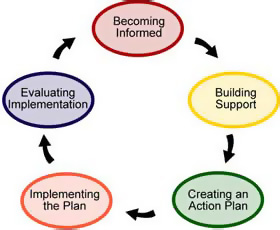What information does Mr. Irwin need to consider before proceeding?
Page 1: Stages of Implementing Change
 Although Mr. Irwin still has a lot to learn about the RTI approach, he knows that implementing this type of school-wide change requires a systematic process. This module presents one approach to school-wide change. Keep in mind that there are other methods for infusing the RTI approach into a school.
Although Mr. Irwin still has a lot to learn about the RTI approach, he knows that implementing this type of school-wide change requires a systematic process. This module presents one approach to school-wide change. Keep in mind that there are other methods for infusing the RTI approach into a school.
Mr. Irwin will adhere to the change process depicted in the figure below. This process will enable him to systematically lay the foundation for implementing the RTI approach at Mayflower Elementary. In this way, Mr. Irwin will avoid moving to the implementing the plan stage prematurely and, therefore, will maximize the probability that RTI will be effective at Mayflower. The five stages in the change process are:
- Becoming informed

- Building support
- Creating an action plan
- Implementing the plan
- Evaluating implementation
As demonstrated by the figure above, the process of school-wide change is cyclical. Once a school has advanced through the final stage (i.e., evaluating implementation), the data will indicate areas in which the school needs to improve. These areas, in turn, become the topics on which the school needs to become more informed or knowledgeable, and thereby the process begins again.
Listen as Pearl Sims describes the nuances of the change process (time: 1:40).

Pearl Sims, PhD
Former Director, Leadership Development Center
Vanderbilt University
Transcript: Pearl Sims, PhD
I think in terms of change, what we have to do is to be very open to gathering information. Based on the information that they have, add new information to it, then begin to build support for what does this information really mean to us, what does it mean to the students we’re serving. And, out of that, begin to say, “So what do we do about this?” You’re taking the best we know about RTI, helping to bring people along in understanding the benefits as well as the challenges, beginning to think about collective action, beginning to think through, how then do we really implement this wisely—not just in terms of step 1, step 2, with timeline and resources, which is your traditional model of implementation, but implementing for the purposes of creating buy-in from your faculty, from your staff—and beginning to see it as a way that you’re constantly improving the choices you’re making. So often what happens is implementation is either considered the first step or not considered at all. And the truth is it’s a very meticulous step in the planning process. Implementation really is that wonderful process about which you bring people together to decide, “OK, if this is what we’re going to do, how do we do it?” It is that implementation phase that you get true ownership in solving the problem together. And then, finally, “How do we evaluate what we are doing together?” So this is a cycle that really good leaders will always use when trying to help a school, help their teachers begin to really move and react to new knowledge as it comes into the school.